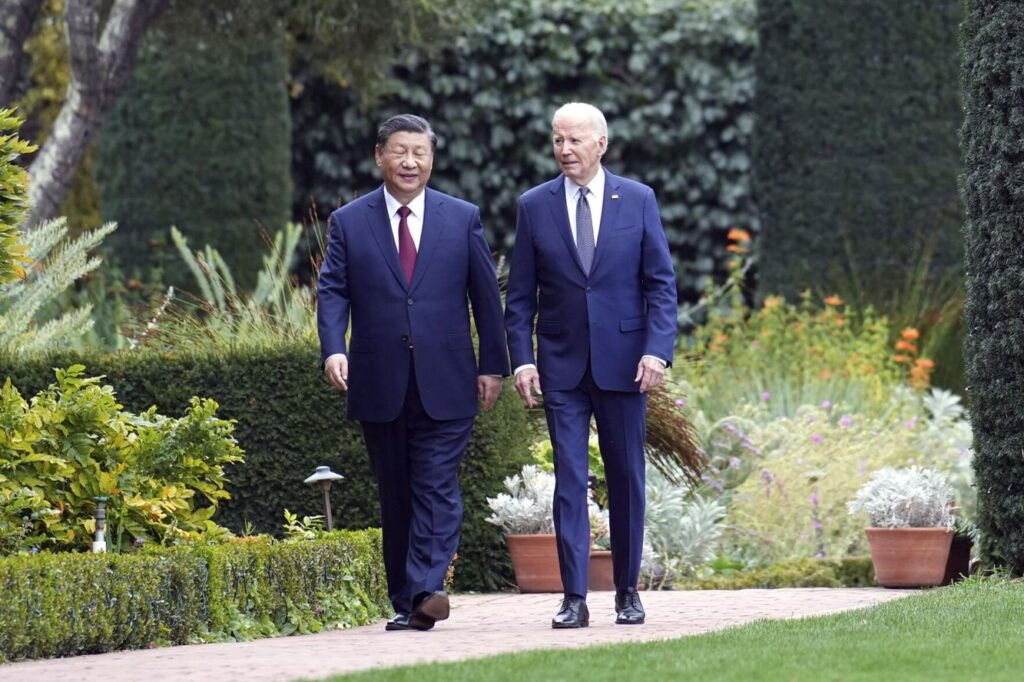History doesn’t always repeat itself, but sometimes there’s an echo, reports the Taiwan-based World Journal.
Thirty years ago, Chinese leader Jiang Zemin traveled to Seattle for the APEC conference where he met with then President Bill Clinton. The meeting came as relations between the two countries had reached troubling lows. That same year Clinton revoked China’s Most Favored Nation Status, this on top of the long list of sanctions Washington maintained. A Chinese vessel, the Yinhe, was also blockaded at America’s request in international waters on suspicion of transporting chemical weapons to Iran. A later investigation found no such chemicals, though no apology was offered.

Still, Jiang reportedly brought with him a custom-made saxophone as a gift to Clinton, and later traveled to San Francisco where he opened the door to lucrative deals with US businesses. Some trace China’s eventual economic rise to this period.
Fast forward to today, with a highly anticipated meeting between President Bill Clinton and Chinese leader Xi Jinping on the sidelines of the APEC conference Wednesday fueling speculation among some Chinse netizens that a similar turnaround in US-China relations might be in the offing. Some commenters expressed hope the meeting might “support China’s integration into the world’s mainstream society,” while others were more skeptical, citing a hostile environment and an unpredictable partner. “Don’t have unrealistic illusions about the United States.”
Here to Work
Over 300 activists traveled form North Carolina to Washington DC this past week to press the Biden administration to extend labor protections to all immigrants regardless of immigration status, reports La Conexión. The event was part of the Here to Work Day of Action organized by pro-immigrant advocacy groups across the country. More than 3000 people attended the event, organizers said. Among the demands were work permits for immigrants who have been paying taxes in the country for years, regardless of immigration status, and an expansion of Temporary Protected Status for migrants from countries designated too dangerous to return to. “We continue to fight for immigration reform, but until that happens, we support extending a work permit to all immigrants,” said Antelmo Salazar, president of Colectivo NC, one of a number of groups involved in the week’s events.
More Koreans enlisting in US military
There was a 30% jump in the number of Koreans enlisting in the US military this year, reports the Korea Daily, after a slump during the pandemic. Koreans are among several groups most likely to naturalize after enlistment, the paper notes. A total of 12,140 people opted to naturalize from the military in FY 2022-23. Filipinos are the most likely to naturalize, followed by Jamaicans, Mexicans, Nigerians, Chinese and Koreans. The economy was cited as one reason for the uptick. “When we do recruitment outreach, there are a lot of Koreans who are interested in joining the U.S. military because the economy is so bad after the pandemic,” Hyungmin Lee, an Army recruiter working in LA’s Koreatown, told the paper.
America’s first dictator
A recent NYT/Siena poll showed former President Donald Trump with a competitive edge over Joe Biden in 4 out of 5 key swing states. That news was followed by headlines from the Washington Post that purportedly reveal plans being laid out by the Trump team that would grant the president unprecedented powers over the federal government. Proposals under the so-called “Project 2025” plan include giving the military powers to quash protests while unleashing a campaign of vengeance targeting Trump’s political foes, including Biden. “Trump has made it clear that he will curtail civil liberties as soon as he can,” writes Gabriel Lerner with Hispanic LA, noting the ideas laid out go well beyond mere intellectual exercises. “Authoritarianism is on the ballot in 2024. And it must be defeated.”
Aid for Palestine
“We’ve come to Egypt to speak to the world directly from the border of Gaza.” Those are the opening words from an international delegation that traveled recently to Egypt to bring attention to the ongoing Israel-Palestine conflict. Author, activist and journalist Margaret Kimberley was among the group and, as she writes in the Black Agenda Report, “It is crucial that independent media have an opportunity to be on the ground at important places and in key moments.” Seeking to reach Rafah, on the Egyptian border with Gaza, the group was ultimately denied and again was later blocked and detained by police after attempting to submit a letter of protest to the US embassy. “The fact that a small group of committed people would be seen as a threat to U.S. and Egyptian interests is an indication that public outcry about genocide and war crimes has made a powerful nation very nervous,” writes Kimberley.
A win for state-recognized tribes
The 80th annual National Congress of American Indians conference took place this week in New Orleans, reports Indian Country Today, with a major vote on whether or not to deny tribes recognized by states but not by the federal government continued voting powers with the body failing to pass. This year’s conference was held on lands traditionally belonging to the United Houma Nation, one of 23 tribes that would have lost voting rights had the motion won. Created in 1944, the NCAI is one of the largest and oldest advocacy organizations representing Native American and Alaska Native communities. “Imagine my shock and surprise and sadness when I learned that tribes from miles away are coming to our ancestral homelands to tell us… that not only are we not a tribe, but that we are not even Indian people,” said Lora Ann Chaisson, principal chief of the United Houma Nation, a day ahead of the vote.
Gen Z on Why Environmental Sciences
What do you want to be? What do you want to focus on? What are you passionate about? These are all questions that even working professionals and grown adults sometimes struggle with, and yet first-year college students are asked to come up with answers seemingly on spot. For Sonar Agarwal, whose interests span from maps to coding to the great outdoors and beyond, a degree in Environmental Science offers her the chance to dip her toes in a wide range of fields while opening the door to an equally wide range of career opportunities and, maybe, just maybe, help solve the climate crisis. “In a world where everyone seemed to be going into popular fields such as computer science, biology, or business and law, many questioned what jobs would be available to me with a degree in Environmental Science. Little did they know that environmental science encompasses all these popular fields.” Read the story at Siliconeer.






